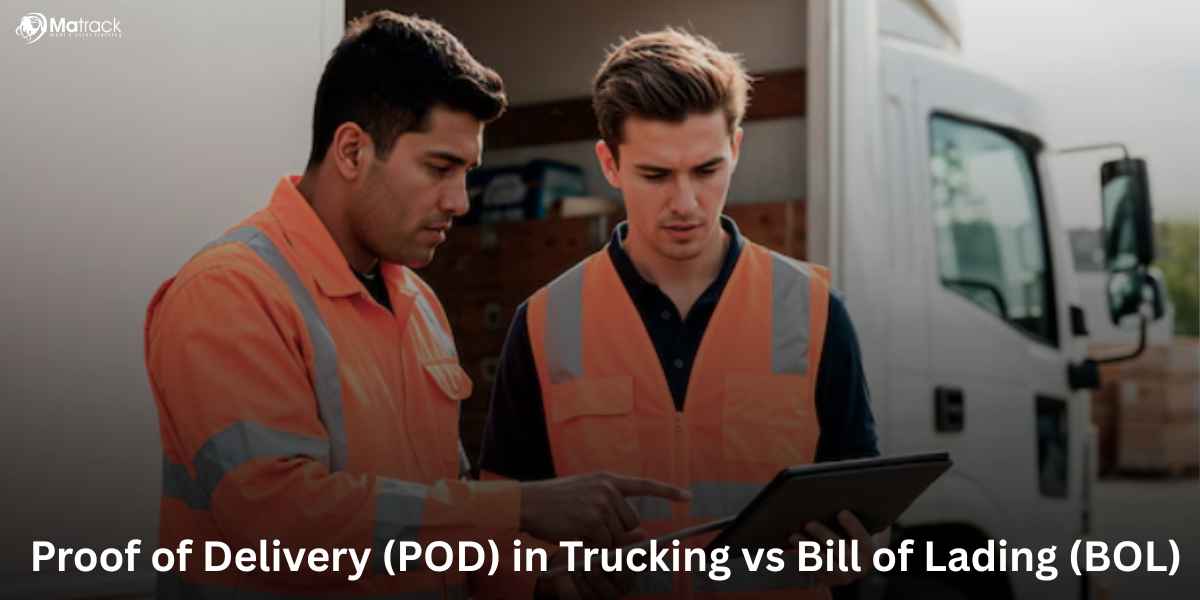Key Takeaways:
- Truck driving provides freedom, steady income, and opportunities to travel while working.
- The job comes with challenges like long hours, loneliness, and maintaining a healthy lifestyle.
- A Commercial Driver’s License (CDL) offers diverse career options, job security, and good benefits.
- Matrack helps truck drivers improve safety, reduce costs, and run fleets efficiently with its advanced tools.
Truck driving is an important job that helps deliver goods and keep businesses running. It gives people a chance to earn well, travel, and enjoy a sense of freedom.
At the same time, it can be a tough job with challenges like long hours and being away from family. It’s important to understand both the good and bad before starting this career.
Pros of Becoming a Truck Driver
1. Independence
Truck driving job offers a sense of freedom that most careers don’t provide. You are responsible for your schedule, routes, and breaks, with no one constantly watching over you.
The truck becomes your workspace, and the road becomes your office. For those who prefer working alone, this independence can be incredibly satisfying.
2. Traveling
A career in trucking allows you to see new places while earning a living. From quiet countryside roads to major cities, the job offers a chance to experience diverse landscapes.
The open road can feel peaceful, and the sense of exploration adds excitement. Breaks during trips can become opportunities to discover interesting places nearby.
3. Job Security
There is always a need for drivers to transport goods, making this a stable career choice. A CDL ensures steady work, as the demand for freight transportation never slows down.
Even in times of economic uncertainty, jobs in this field remain secure. For those wanting more flexibility, owning a truck opens the door to even more opportunities.
4. Versatility of a CDL
Getting a CDL provides options to work in different areas of the industry. Drivers can choose roles like hauling flatbeds, refrigerated trailers, or tankers based on their interests.
It also allows for a career shift into delivery jobs with companies like UPS or FedEx if long-haul driving isn’t appealing. A CDL offers flexibility that few other qualifications can match.
5. Making an Impact
Delivering goods ensures people have access to the items they need in their daily lives. From groceries to electronics, these products reach stores and homes because of skilled drivers.
Knowing that your work keeps industries running can be highly rewarding. It’s a role that makes a difference, even if it often goes unnoticed.
6. Benefits Beyond the Pay
Trucking jobs often come with strong benefits, including health insurance, retirement plans, and paid vacation. Companies also offer bonuses and family coverage to attract and retain workers.
Many of these benefits are available to new hires from the start, reflecting the growing demand for skilled drivers. It’s a career where both the paycheck and additional perks make a real impact.
Cons of Becoming a Truck Driver
1. Loneliness
Truck drivers often spend long hours or even weeks alone on the road. Being far from home, sometimes 1,500 miles away, can feel isolating and emotionally draining.
Even those driving local routes spend most of their day without much interaction. For long-haul drivers, weeks away from family can make loneliness a significant challenge.
2. Time Away From Home
Truck drivers frequently struggle with spending extended periods away from loved ones. Long-haul trips often mean missing family time, routines, and important events.
While some companies offer brief stays at home after several days on the road, the time is often short. This makes it tough for drivers who value being present at home consistently.
3. Challenging Lifestyle
Maintaining a healthy lifestyle as a truck driver is not easy. Limited access to kitchens often leads to relying on fast food or meals from truck stops.
Long hours and tight schedules leave little time for exercise or proper rest. Over time, this lifestyle can affect both physical and mental health.
4. Strict Regulations
Truck drivers must comply with strict safety and operational rules set by the Federal Motor Carrier Safety Administration (FMCSA). Failure to follow these regulations can result in fines, suspension of a CDL, or job loss.
Staying informed about constantly changing rules can be a challenge. Non-compliance can lead to severe consequences, adding more pressure to the job.
5. High Stress Levels
Truck drivers often face significant stress due to the nature of their work. Managing traffic, meeting strict deadlines, and handling interactions with other drivers can be overwhelming.
The responsibility of safely delivering valuable cargo on time adds to the pressure. This makes truck driving one of the more demanding professions.
6. Cost of CDL Training
Becoming a truck driver requires earning a Commercial Driver’s License (CDL), which can be expensive. Training programs and private schools often charge thousands of dollars.
Many new drivers rely on loans or savings to cover these costs. Figuring out how to afford training is a common barrier for those entering the industry.
Tips for Success as a Truck Driver
- Stay Healthy: Do simple exercises during breaks and bring healthy snacks to avoid unhealthy eating on the road.
- Keep in Touch: Use phone calls, video chats, or messages to stay connected with family and friends.
- Find Support: Join trucking groups or forums to connect with other drivers who understand the job.
- Grow Your Career: Look into getting certifications, like hazardous materials or tanker endorsements, to earn more and open up new job opportunities.
How Matrack Helps Truck Drivers
Matrack Fleet Management makes driving safer and more efficient. It’s AI-powered fleet dash cam monitors for driver fatigue, distractions, and collisions, sending alerts to help drivers stay safe.
Matrack also helps drivers find the cheapest fuel nearby and tracks driving habits to reduce costs. With easy-to-use tools like its electronic logging device (ELD), it helps fleets run smoothly and efficiently.
Matrack is a reliable option for drivers and fleet managers looking to improve safety, save money, and boost performance.
Conclusion
Truck driving offers freedom, steady work, and opportunities to explore new places. It’s a career that comes with benefits, but it also has challenges like being away from home and managing a demanding lifestyle.
Knowing the positives and negatives can help you decide if it’s the right path for you. By staying healthy, building support, and improving your skills, you can make the most of this profession.






